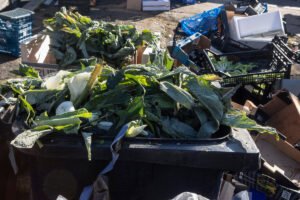Tuesday, 17 February 2026
Strengthening Canada’s agri-food value chain through innovation and investment
Lisa Campbell, Senior Director of Programs at Protein Industries Canada Canada is establishing itself as a global leader in the plant-based protein sector, with Protein Industries Canada (PIC) leading the…

Lisa Campbell, Senior Director of Programs at Protein Industries Canada
Canada is establishing itself as a global leader in the plant-based protein sector, with Protein Industries Canada (PIC) leading the way. Through strategic investments and collaborative projects, PIC is driving innovation, strengthening domestic supply chains, and positioning Canada to capitalise on a $25 billion agrifood opportunity.
One notable project is a $32.5 million initiative in collaboration with Phytokana and Maia Farms. This project aims to advance next-generation processing technologies and unlock new value from Canadian crops, such as fava beans. In an interview with NUFFOODS Spectrum, Lisa Campbell, Senior Director of Programs at Protein Industries Canada, shares insights on how this initiative aligns with the organisation’s broader goals, Canada’s competitive advantages in sustainable crop production, and the role of innovation in shaping the future of plant-based proteins.
This $32.5 million project represents a significant investment in Canada’s plant-based ingredient ecosystem. How does it align with Protein Industries Canada’s broader mandate of strengthening the country’s agri-food value chain?
Protein Industries Canada is dedicated to supporting the growth of Canada’s plant-based ingredient manufacturing and food processing sector. We believe Canada is on the brink of a $25 billion opportunity that will secure, strengthen and stabilise our domestic food supply chain—but this opportunity can only be achieved through strategic support of our country’s agrifood sector. This includes investment into Canada’s protein ingredient innovation—like this one—that can help to not only expand the number of facilities operating on Canadian soil, but also provide Canadian families with a wider variety of protein-rich options developed here at home.
One of the stated goals is to enhance domestic supply chain resilience. Can you elaborate on how projects like this reduce Canada’s reliance on imports and create stronger links between farmers, processors, and food innovators?
Canada has a vast landmass and a robust agricultural sector. By processing more of our protein crops here in Canada, we create a stronger, more reliable supply chain. This means customers around the world can count on Canadian ingredients that are high-quality, sustainably produced, and traceable from farm to table. It strengthens our economy at home while ensuring Canada remains a trusted supplier abroad.
As other countries ramp up investment in plant-based proteins, what unique advantages does Canada hold in establishing itself as a global leader in high-value, sustainable ingredients?
Canada already holds a strong global reputation as a provider of high-quality crops. We can build on this, by adding value to those crops and turning them into high-quality protein ingredients and finished food products. Canadian crops are some of the most sustainable in the world because of our farming practices such as zero-till, and our unique three crop rotation of cereals, oilseeds and pulses. This leads to a very low carbon footprint of crop production. We also can be a reliable supplier of a wide variety of high protein crops because of the diversity and the vast number of crops we grow, including fava beans, but also peas, oats and canola.
Phytokana is using a proprietary technology that avoids heat and chemicals, while Maia Farms is advancing fermentation for mycelium-based proteins. From your perspective, how critical is it to support these kinds of next-generation processing technologies for long-term competitiveness?
Consumer demands are ever-evolving, both in Canada and around the world. Innovation is key to meeting those demands. By supporting our Canadian ingredient manufacturers and food processors in investing in the latest technology to develop new formulations, Canada can ensure its resiliency in a competitive global market to become a leading supplier of plant protein products.
How do you expect this project to contribute not only to job creation and economic growth but also to Canada’s environmental sustainability goals, such as emissions reduction and improved traceability?
Phytokana and Maia Farms are each dedicated to improving their traceability and reducing their emissions. This will be achieved, in part, due to the advancement in technology the companies develop throughout their project, as well as the use of Canadian protein crops in place of inputs imported from other countries. The work to support emissions reduction and improved traceability involves closed-loop production, including R&D, analysis and evaluation to determine linkages between farm to finished product. Domestic value-added processing allows Canada to manufacture, market and sell all components of the seed—creating more economic value for the seed’s starch, oil, fibre and protein. The building of Phytokana’s new facility and sourcing crops from Canadian farmers, meanwhile, will contribute to new jobs and economic opportunities in rural Alberta.
With fava beans as a focus here, do you see Protein Industries Canada supporting similar projects with other underutilised crops, and what role do you envision for Canada’s protein innovation cluster over the next decade?
Currently, Protein Industries Canada supports the use of Canadian broad-acre protein crops. This includes many widely grown crops such as canola, lentil and chickpea, but also emerging crops such as fava and lupin. We anticipate supporting similar projects in the future as we continue our mandate to grow Canada’s plant-based food, feed and ingredient sector and help Canada reach its $25 billion agrifood potential. Continued investment into agriculture and food innovation will not only strengthen Canada’s economy but help the country remain competitive and a preferred trading partner in the global food landscape, helping secure global supply chains and meet demand for nutritious, sustainably produced ingredients and food.
Shraddha Warde
shraddha.warde@mmactiv.com
Technology
Carlsberg Launches AI-Crafted Lunar New Year Packaging
Feb 17, 2026 | Beverages
FAO Experts Assess Risk of Antimicrobial Resistance Spreading via Food Loss and Waste
Feb 17, 2026 | Sustainability
Setting the Standard for Sustainable Ingredients
Feb 16, 2026 | Ingredients
Food Testing
Redefining Trust in Organic Foods through Independent Testing
Feb 13, 2026 | Food Safety and Testing
AFNOR International Eyes Global Food Safety Growth with HACCP Group Takeover
Feb 04, 2026 | Australia
More Popular
Cerealto Sells Pasta Unit to Specialist Player Cerealis
Feb 17, 2026 | Company News
New Nestlé Vital nutritional drink targets rising demand for healthy-ageing solutions
Feb 17, 2026 | Company News
Carlsberg Launches AI-Crafted Lunar New Year Packaging
Feb 17, 2026 | Beverages






